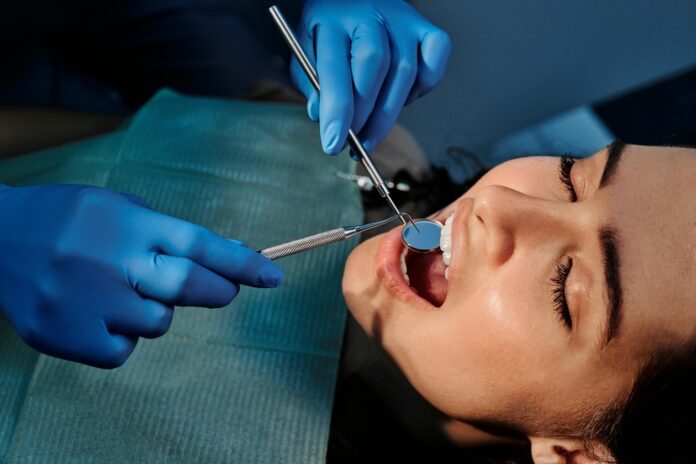Regular dental checkups are essential for catching issues early, preventing bigger problems, and reducing costs. They also help detect conditions like gum disease or oral cancer, contributing to both oral and overall health.
Early Detection Saves Time and Money
Preventive dental care operates on a simple principle: catching problems early makes them easier and less expensive to treat. A small cavity detected during a routine cleaning might require only a basic filling. Left untreated, that same cavity could develop into an infection requiring root canal therapy, a crown, or even tooth extraction and replacement.
The financial difference between these scenarios can be substantial. A routine filling typically costs a few hundred dollars, while a root canal and crown can cost several thousand. More complex procedures like dental implants or bridges multiply these costs even further.
Early detection also means less time in the dental chair. Minor issues can often be resolved in a single appointment, while advanced problems may require multiple visits and extended treatment plans. Regular checkups help you avoid the inconvenience of emergency dental visits and lengthy recovery periods.
Professional Cleaning Prevents Disease
Even the most diligent daily brushing and flossing cannot remove all plaque and tartar buildup. Professional dental cleanings reach areas that home care misses, using specialized tools to remove hardened deposits that can lead to gum disease and tooth decay.
Gum disease affects nearly half of adults over 30, yet many people remain unaware they have it until it reaches advanced stages. Early gum disease, called gingivitis, causes gums to become red, swollen, and prone to bleeding. At this stage, professional cleaning combined with improved home care can reverse the condition completely.
When gingivitis progresses to periodontitis, the consequences become more serious. Advanced gum disease can cause tooth loss, bone deterioration, and has been linked to increased risk of heart disease, stroke, and diabetes complications. Regular professional cleanings help prevent this progression by maintaining healthy gums and removing bacterial buildup.
Choosing a dental practice that pairs thorough preventive care with restorative and cosmetic services can make follow-up treatment faster and more comprehensive for patients who need it. Practices that provide advanced diagnostics, implant placement, and smile‑enhancement options let clinicians move quickly from detection to definitive care without repeated referrals.
When comparing providers, consider those offering in‑house restorative and cosmetic expertise—such as San Diego Dental Center—alongside routine cleanings and education. That integrated approach helps ensure patients receive coordinated treatment plans that address both health and aesthetic goals.
Oral Cancer Screening Could Save Your Life
Oral cancer affects thousands of Americans each year, and early detection dramatically improves survival rates. During routine dental checkups, dentists and dental hygienists perform visual and tactile examinations of your mouth, throat, and neck, looking for signs of abnormal tissue growth or other warning signs.
Many cases of oral cancer develop without obvious symptoms in early stages. Patients might notice persistent sores, unusual lumps, or changes in the color or texture of oral tissues only after the cancer has progressed. Regular screening allows professionals to identify suspicious areas before they become visible or symptomatic to patients.
The Connection Between Oral and Overall Health
The mouth serves as a gateway to the rest of your body, and oral health problems can contribute to systemic health issues. Bacteria from gum disease can enter the bloodstream and travel to other parts of the body, potentially contributing to inflammation and infection elsewhere.
Research has identified correlations between poor oral health and several serious conditions. People with gum disease face increased risk of heart disease and stroke. Diabetics with gum disease often struggle with blood sugar control, while uncontrolled diabetes makes gum disease more severe. Pregnant women with gum disease have higher rates of premature birth and low birth weight babies.
While the exact mechanisms behind these connections continue to be studied, the evidence strongly suggests that maintaining good oral health through regular dental care contributes to better overall health outcomes.
What Happens During a Regular Checkup
A comprehensive dental checkup typically includes several components designed to assess your oral health thoroughly. The appointment usually begins with a review of your medical history and any changes in your health since your last visit.
The clinical examination involves checking your teeth for signs of decay, wear, or damage. Your dentist, like the best dentists in Salt Lake City, will also examine your gums for signs of inflammation or disease and may measure the depth of spaces between your teeth and gums to assess gum health. Many offices, including those with the best dentists in Salt Lake City, use digital X-rays to reveal problems not visible during the visual examination, such as decay between teeth or issues with tooth roots and jawbone.
Professional cleaning removes plaque and tartar buildup, polishes teeth, and may include fluoride treatment to strengthen tooth enamel. Many offices also provide education about proper brushing and flossing techniques tailored to your specific needs.
How Often Should You Visit?
Most dental professionals recommend checkups every six months for patients with good oral health. This schedule allows for consistent monitoring and professional cleaning while catching problems early. That being said, individuals with higher risk factors would need to visit more frequently.
Patients who often face dental problems like gum disease, frequent cavities, or other medical conditions should visit every three to four months to enjoy benefits. Smokers, people with diabetes, and those taking medications that affect saliva production often require more frequent monitoring.
Your dentist can recommend the optimal schedule based on your specific situation. Following their recommendations helps ensure that your oral health remains stable and that any problems are addressed promptly.
Conclusion
Regular dental checkups represent one of the most effective investments you can make in your long-term health and well-being. The combination of early problem detection, professional cleaning, cancer screening, and personalized oral health education provides comprehensive protection for your smile and your overall health.






